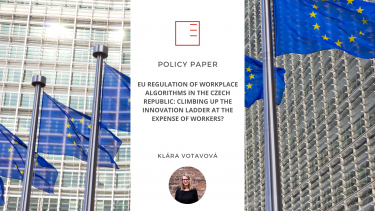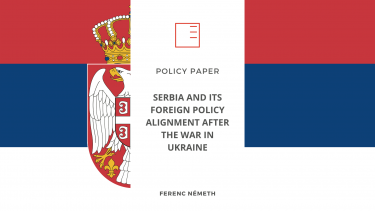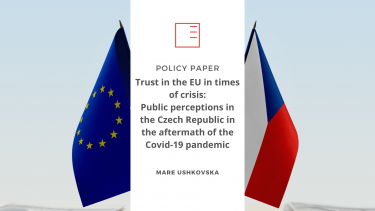iDNES: The EU will turn off your appliances. Lies about the Green Deal have taken over the internet in the Czech Republic
Our junior researcher Tatiana Mindeková conducted an analysis of the narratives around the Green Deal in the Czech and Slovak information scene. What kind of misinformation about the EU climate policy is being voiced in mainstream and alternative media? Tatiana Mindeková commented on the results of her research for iDNES.cz.
Show moreSUMMARY OF EXPERIENCES WITH THE INVOLVEMENT OF CSOS IN V4 IN THE DECARBONISATION PROCESS
The project is focused on the examination of the role of non-governmental organizations in the process of decarbonization of coal regions in V4 countries (Czech Republic, Hungary, Poland, Slovakia). The aim of the project is to describe the best and worst practices of the individual processes for Serbia, who awaits the transformation of its energy mix, largely based on coal. The examined V4 countries have had a slightly different share of coal in their energy mix, while the largest one being in Poland and the second largest one in the Czech Republic, followed by Hungary and Slovakia. There are many similarities and differences in their takes on decarbonisation, thus providing different range of experiences.
Show more PDF

Report | Monitoring of the EU's Green Policies: Perceptions and Narratives in the Czech and Slovak Information Space
The European Green Deal is the core of the current climate strategy of the European Union, which has set the goal of making Europe a carbon-neutral continent by 2050. In an effort to monitor and counter disinformation narratives about the deal, IRI's Beacon project launched an initiative called the “European Green Deal: Mapping perceptions in Central and Eastern Europe,” in which six partner organizations studied how the deal is perceived in Bulgaria, Czechia, Poland, Romania, and Slovakia. Our project manager and juniour researcher, Tatiana Mindeková, analyzed narratives spread about the Green Deal and the EU’s green policies through Czech chain emails as well as through selected mainstream media and websites known for spreading disinformation.
Show more PDFPOLICY PAPER | EU Platform workers‘ directive: A test for regulating the future of work
A policy paper by our research intern Silke Maes entitled "EU Platform workers' directive: A test for regulating the future of work" takes a closer look at the aforementioned Directive on improving working conditions at work through platforms. The paper details the impact of the development of platforms on working conditions and then argues that the Directive is the first EU attempt to respond to this development.
Show morePolicy Paper | EU Regulation of Workplace Algorithms in the Czech Republic: Climbing up the Innovation Ladder at the Expense of Workers?
Our researcher Klára Votavová has written a policy paper in which she discusses the new dilemmas concerning the balance of competitiveness and decent work standards in the Czech Republic, which are emerging with advancing digitalization and automation.
Show more PDFPolicy Paper | Serbia and Its Foreign Policy Alignment after the War in Ukraine
Ferenc Németh, a researcher on the politics, security and integration of the Western Balkans, has written a policy paper under the project Think Visegrad in Brussels. In it he examines Serbia's foreign policy towards the European Union after the Russian invasion of Ukraine.
Show more PDFPolicy Paper | Trust in the EU in times of crisis: Public perceptions in the Czech Republic in the aftermath of the Covid-19 pandemic
How has the Covid-19 pandemic affected the Czechs' relationship with the European Union? This topic is addressed in a policy paper by visiting fellow Mare Ushkovska.
Show moreBLOG | “A Close Neighbor Is Better Than a Distant Relative” - Belt and Road Initiative: Are We Closer After 10 Years?
In 2013, the Chinese president introduced the New Silk Road project, also known as the Belt and Road Initiative. It was to connect China with countries in Central Asia, the Middle East, Europe and maritime regions with the purpose to coordinate policies and link infrastructure. However, the initiative, and especially China's role in it, raises many questions and doubts. What is its future? This is what our intern Šárka Váchalová discusses in her blog.
Show moreINVITATION | EU-Pacific Talks: Europe and the Indo-Pacific: Migration and demographic changes
We would like to invite you to a debate "EU-Pacific Talks: Europe and the Indo-Pacific: Migration and demographic changes", which will take place on 30 January at 13:00 online on our Facebook page.
Show more
iROZHLAS: Suspension of the Erasmus programme for Hungary? "Punishment and isolation of students."
Hungarian students from 21 universities are at risk of not being able to participate in the Erasmus+ education programme. The European Commission has temporarily cut them off. "The students who stand to lose the most from Erasmus are not the children of upper-middle-class parents, but those from smaller towns and rural areas. They don't have the means to travel abroad," Hungarist Oszkár Roginer, Global EU project manager at the EUROPEUM Institute, criticised the decision to iROZHLAS.cz.
Show more
Staroměstské náměstí 4/1
Prague 1 - Staré Město
110 00
tel.: +420 212 246 552
email: europeum@europeum.org
https://www.europeum.org









